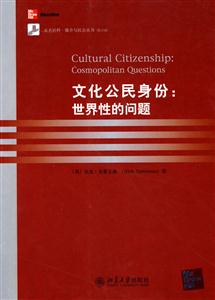-
>
論中國
-
>
中共中央在西柏坡
-
>
同盟的真相:美國如何秘密統治日本
-
>
中國歷代政治得失
-
>
中國共產黨的一百年
-
>
習近平談治國理政 第四卷
-
>
在慶祝中國共產主義青年團成立100周年大會上的講話
文化公民身份-世界性的問題 版權信息
- ISBN:9787301170199
- 條形碼:9787301170199 ; 978-7-301-17019-9
- 裝幀:一般膠版紙
- 冊數:暫無
- 重量:暫無
- 所屬分類:>>
文化公民身份-世界性的問題 本書特色
《文化公民身份:世界性的問題》:未名社科·媒介與社會叢書(影印版)
文化公民身份-世界性的問題 內容簡介
為什么“文化”成為政治爭論的核心?
在信息時代,我們應該如何重新思考公民身份的問題?
什么是世界主義?它會成為未來的基本典范嗎?
本書將身份、個性化、文化多元主義與調解納入文化政治學的研究范疇,從政治學理論、文化研究和社會學的爭論中借鑒經驗,集中討論了如下問題:
·全球化引致的公民身份重塑
·新社會運動
·民族-國家的衰落
·流行文化的沖擊
史蒂文森認為,世界主義的問題越來越有可能出現在這些領域。無論我們在討論環境破壞,還是文化政策、城市、消費者文化的議題,這些問題都可能與世界主義的維度有關。權利、義務和文化方面的議題如今都已成為我們思考這個世界的中心內容。這本原創性的著作提請我們重新思考什么樣的政治和人格才是適應信息時代的。
文化公民身份-世界性的問題 目錄
acknowledgements
introduction
1 cultural citizenship
t.h. marshall and raymond williams: a cultural citizenship?
cultural citizenship in the information age
the culturation of citizenship
civil society, culture and public space
identity, difference and cultural politics
the challenge of individualization
conclusion
notes
further reading
2 cosmopolitan and multicultural citizenship: world, nation, city and self
disarmament and european cosmopolitanism
the new political cosmopolitans
national citizenship: liberalism and multiculturalism
multicultural citizenship: iris marion young, will kymlicka and bhikhu parekh
cosmopolitanism and multiculturalism
the city as a contested space
cosmopolitan cultures and cosmopolitan selves
conclusion
notes
further reading
3 ecological and cultural citizenship: across the nature/culture divide
culture and nature
cosmopolitan and ecological citizenship
modernity, progress and consumption
risk, science and democracy
cinematic representations of risk: safe
cyborg relations: humans, animals and technology
vulnerability, voice and community
conclusion
note
further reading
4 media, cultural citizenship and the public sphere
media, citizenship and cultural power
cultural citizenship in a global mediated culture
human rights, social movements and global media
technocultures, media and community
speed and communication
moral indifference and cosmopolitanism
media, popular culture and the deconstruction of public and private
conclusion
note
further reading
5 consumerism, cultural policy and citizenship
consumer culture and the death of citizenship
consumer culture as citizenship
questions of cultural capital
cultural policy and questions of governance
a 'common' cultural citizenship
conclusion
further reading
6 cultural citizenship: a short agenda for the future
glossary
bibliograpuy
index
文化公民身份-世界性的問題 節選
《文化公民身份:世界性的問題》內容簡介:為什么“文化”成為政治爭論的核心?在信息時代,我們應該如何重新思考公民身份的問題?什么是世界主義?它會成為未來的基本理念嗎?《文化公民身份:世界性的問題》將身份、個性化、文化多元主義與文化政治聯系起來,并從政治學理論、文化研究和社會學的爭論中借鑒經驗,集中討論了如下問題:全球化對公民身份的重塑;新社會運動;民族一國家的衰落;流行文化的沖擊。史蒂文森認為,世界主義的問題越來越有可能出現在這些領域。無論我們在討論環境破壞,還是文化政策、城市、消費者文化的議題,這些問題都可能與世界主義的維度有關。權利、義務和文化方面的議題如今都已成為我們思考這個世界的中心內容。這本原創性的著作提請我們重新思考什么樣的政治和人格才是適應信息時代的。
文化公民身份-世界性的問題 相關資料
But crucially involves the direct intervention of ethical communities,feminist campaigners, green networks, religious denominations, trade unions,ethnic organizations and parents' groups. A society-wide conversation isdependent upon the emergence of an 'energetic civil society' that is able to forceissues and perspectives on to a public agenda. A robust civil society ensures thatthe communicative basis of society never becomes completely colonized byagencies of money and power. Civil society, then, under certain circumstances,is able to convert itself into communicative power through the channels ofpublic communication and the activation of public normative sentiment. Forthe public sphere to be socially just, it must both prevent the manipulation ofthe public by forces with vested interests in social control and pull togetheran otherwise fragmented public. A widespread, publicly inclusive conversationwould shatter attempts at 'information processing strategies' and replace themwith genuinely communicative interests and passions. A communicative civilsociety would produce a cultural citizenship where the public were capable oflearning from one another's viewpoints. The creation of a robust civil society is, however, constantly threatened by thecolonizing capacity of money and power. According to Benjamin Barber (2001)there are at least three dangers to the creation of an engaged civil society.The first is the bureaucratic mechanisms of government that seek to manageand limit public criticism. These can emerge through hegemonic strategiesof 'incorporation' and exclusion, censorship and the division of oppositionalsentiments. The second is the belief that markets promote democratization.Markets tend to promote individualistic goals and choices, limiting our capacityto deliberate upon the common good. Finally, civil society is threatened by ayearning for undifferentiated and homogeneous communities. Whereas marketsfoster individual yearnings, they uninte
文化公民身份-世界性的問題 作者簡介
尼克·史蒂文森(Nick Stevenson)英國諾丁漢大學社會學與社會政策學院高級講師,著有《文化、意識形態和社會主義》(1995)、《媒介的轉型》(1999)、《文化與公民身份》(2001)、《讀懂男性雜志》(與彼得·杰克遜和凱特·布魯克斯合著)(2001)、《理解媒介文化》(2002)等著作。
- >
中國人在烏蘇里邊疆區:歷史與人類學概述
- >
回憶愛瑪儂
- >
我從未如此眷戀人間
- >
二體千字文
- >
月亮與六便士
- >
唐代進士錄
- >
姑媽的寶刀
- >
月亮虎















